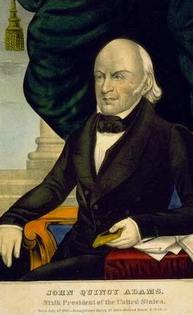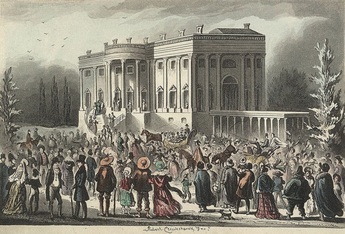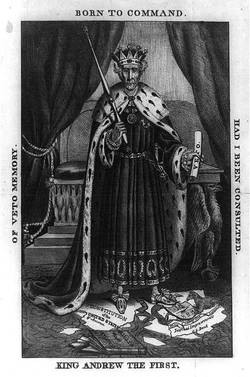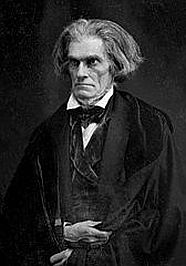Jacksonian Democracy
|
Profiles * Political Thought * Colonial Government * Revolution * Constitution * Birth of Party Politics * War of 1812 * James Monroe: "Era of Good Feeling" and Monroe Doctrine * Jacksonian Democracy * Regional Conflict and Compromise * 1860 Election of Abraham Lincoln * Civil War 1861-62 * Civil War 1863-65 * Reconstruction and Impeachment of President Johnson * Gilded Age and Progressive Era * 1912 Election of Woodrow Wilson * 1916 Election and World War I * Women's Suffrage * Depression and 1932 Election of Franklin D. Roosevelt * Prelude to World War II * Pearl Harbor and Mobilization * World War II: European Theater * World War II: Pacific Theater * Atomic Bomb and End of World War II * 1948 Truman-Dewey Election * 1960 Kennedy-Nixon Election * 1964 Johnson-Goldwater Election * Civil Rights Movement * Vietnam: Evolution of the American Role * Vietnam: Kennedy Administration and Intervention * Vietnam: Johnson Administration and Escalation * Vietnam: Nixon, Ford and Fall of South Vietnam * 1968 Humphrey-Nixon Election * Watergate Scandal and Resignation of President Nixon * 1976 Carter-Ford Election * 1980 & 1984 Reagan Elections * Clinton Impeachment * 2000 Bush-Gore Election * War in Iraq * 2008 Obama-McCain Election * 2012 Obama-Romney Election |
|
|
....It is to be regretted that the rich and powerful too often bend the acts of government to their selfish purposes. Distinctions in society will always exist under every just government. Equality of talents, of education, or of wealth can not be produced by human institutions. In the full enjoyment of the gifts of Heaven and the fruits of superior industry, economy, and virtue, every man is equally entitled to protection by law; but when the laws undertake to add to these natural and just advantages artificial distinctions, to grant titles, gratuities, and exclusive privileges, to make the rich richer and the potent more powerful, the humble members of society-the farmers, mechanics, and laborers-who have neither the time nor the means of securing like favors to themselves, have a right to complain of the injustice of their Government. There are no necessary evils in government. Its evils exist only in its abuses. If it would confine itself to equal protection, and, as Heaven does its rains, shower its favors alike on the high and the low, the rich and the poor, it would be an unqualified blessing. In the act before me there seems to be a wide and unnecessary departure from these just principles.....
Excerpt from President Jackson's veto message of bill renewing charter of Bank of the United States, July 10, 1832 Avalon Project, Yale Law School |
Fellow-citizens of the United States! the threat of unhallowed disunion-the names of those, once respected, by whom it is uttered--the array of military force to support it-denote the approach of a crisis in our affairs on which the continuance of our unexampled prosperity, our political existence, and perhaps that of all free governments, may depend.
|
|
Leaving Office
As he neared the end of his second term, Jackson supported the nomination of Martin Van Buren, his vice president and former secretary of state, to succeed him. Van Buren had successfully formed a political alliance that had helped elect Jackson, and as secretary of state was the only member of the cabinet to back Jackson during the Peggy Eaton scandal. He also had strengthened the Democratic Party, particularly through rewarding its loyalists with patronage appointments. Before he left office, Jackson offered a long statement reviewing his record and assessing the status of issues still faced by the country, leaving on a note of optimism for the future: ....The progress of the United States under our free and happy institutions has surpassed the most sanguine hopes of the founders of the republic. Our growth has been rapid beyond all former example -- in numbers, in wealth, in knowledge, and all the useful arts which contribute to the comforts and convenience of man... ...My own race is nearly run; advanced age and failing health warn me that before long I must pass beyond the reach of human events and cease to feel the vicissitudes of human affairs. I thank God that my life has been spent in a land of liberty and that He has given me a heart to love my country with the affection of a son. And, filled with gratitude for your constant and unwavering kindness, I bid you a last and affectionate farewell. Andrew Jackson Farewell Address, March 4, 1837 American Presidency Project, University of California at Santa Barbara On the day after Van Buren was inaugurated, he was asked as he took leave of a few friends whether he had any regrets about anything. "Only two," said Jackson. "I regret I was unable to shoot Henry Clay or to hang John C. Calhoun." |



